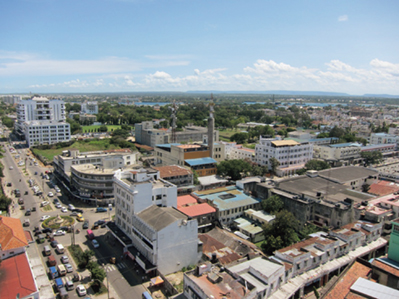(4) Sustainable Cities
Cities are the primary settlement areas of humans and are the focal points of economic, social, and political activities. In recent years, attention has been focused on the issues relating to the administration of cities. The issues include: the handling of the disposal of the substantial waste emitted in urban areas and suburbs, the prevention of air, water, and other environmental pollution, the development of infrastructure facilities including sewage and waste treatment systems, and responses to rapid population increases and the consequent fast pace of urbanization. Addressing these issues and engaging in efforts to realize sustainable cities are priorities for development cooperation.
Among the SDGs, Goal 11 sets forth the following task: “Make cities and human settlements inclusive, safe, resilient and sustainable.” There is thus growing international commitment to resolve the issues of human settlements, including realizing sustainable cities.
<Japan's Efforts>
Based on the Development Cooperation Charter, Japan aims to achieve “quality growth” and poverty eradication through such growth in developing countries. To this end, Japan implements cooperation for realizing sustainable cities, along with efforts to resolve global issues directly related to human settlements, including efforts for promoting disaster risk reduction, recovery from natural disasters, and a sound water cycle.
More specifically, drawing on its know-how and experience, Japan develops infrastructure, including water and sewage, waste, and energy facilities. In addition, Japan carries out disaster risk reduction programs based on the concept of “Build Back Better,” striving to build cities that are more resilient to natural disasters than prior to the disaster. Japan also conducts human resources development.
Furthermore, Japan implements initiatives by providing assistance to the United Nations Human Settlements Programme (UN-Habitat), which promotes sustainable urban development. Notably, Japan also works in collaboration with the UN-Habitat Regional Office for Asia and the Pacific (ROAP), based in Fukuoka, to introduce environmental technology from private-sector companies and local governments in Japan to their overseas counterparts.
The Third UN Conference on Housing and Sustainable Urban Development (HABITAT III) was held in Quito, Ecuador in South America in 2016. At this conference, held once every 20 years, the New Urban Agenda (NUA) was adopted as a policy for international efforts aimed at the solution of issues pertaining to urban problems and human settlements, based on the results of the efforts that each country has undertaken in the area of human settlement. NUA contributes to the achievement of the SDGs including Goal 11, and Japan also intends to advance efforts aimed at the implementation of NUA.

Scene of Mombasa County in Kenya, where the Project for the Formulation of Comprehensive Development Master Plan in the Mombasa Gate City is underway. (Photo: JICA)
